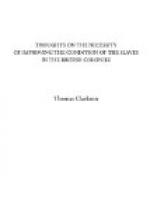I have now proved (as far as the plan[15] of Mr. Steele is concerned) my third proposition, or the probability that emancipation would promote the interests of those who should adopt it; but as I know of no other estate similarly circumstanced with that of Mr. Steele, that is, where emancipation has been tried, and where a detailed result of it has been made known, I cannot confirm it by other similar examples. I must have recourse therefore to some new species of proof. Now it is an old maxim, as old as the days of Pliny and Columella, and confirmed by Dr. Adam Smith, and all the modern writers on political economy, that the labour of free men is cheaper than the labour of slaves. If therefore I should be able to show that this maxim would be true, if applied to all the operations and demands of West Indian agriculture, I should be able to establish my proposition on a new ground: for it requires no great acuteness to infer, that, if it be cheaper to employ free men than slaves in the cultivation of our islands, emancipation would be a profitable undertaking there.
I shall show, then, that the old maxim just mentioned is true, when applied to the case in our own islands, first, by establishing the fact, that free men, people of colour, in the East Indies, are employed in precisely the same concerns (the cultivation of the cane and the making of sugar) as the slaves in the West, and that they are employed at a cheaper rate. The testimony of Henry Botham, Esq. will be quite sufficient for this point. That gentleman resided for some time in the East Indies, where he became acquainted with the business of a sugar estate. In the year 1770 he quitted the East for the West. His object was to settle in the latter part of the world, if it should be found desirable so to do. For this purpose he visited all the West Indian islands, both English and French, in about two years. He became during this time a planter, though he did not continue long in this situation; and he superintended also Messrs. Bosanquets’ and J. Fatio’s sugar-plantation in their partners’ absence. Finding at length the unprofitable way in which the West Indian planters conducted their concerns, he returned to the East Indies in 1776, and established sugar-works at Bencoolen on his own account. Being in London in the year 1789, when a committee of privy council was sitting to examine into the question of the slave trade, he delivered a paper to the board on the mode of cultivating a sugar plantation in the East Indies; and this paper being thought of great importance, he was summoned afterwards in 1791 by a committee of the House of Commons to be examined personally upon it.
It is very remarkable that the very first sentence in this paper announced the fact at once, that “sugar, better and cheaper than that in the West Indian islands, was produced by free men.”




